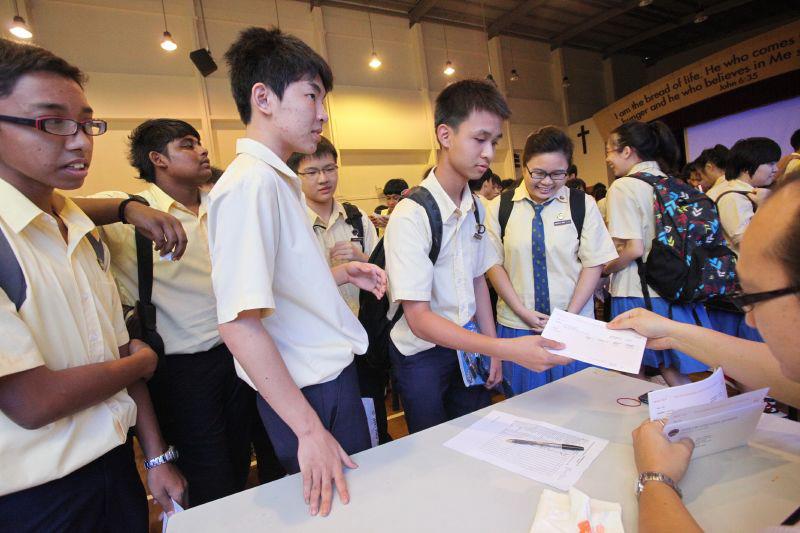It’s been 12 years since I collected my O Level results, but the annual narratives that society perpetuates when it comes to our education coverage remain mind-numbingly predictable.
Despite the Ministry of Education’s efforts in making a conscious, gradual shift away from focusing on results, success stories still fail to cover a balanced, diverse range of scores and plot lines.
Common examples include stories of sacrifice, such as those that feature students who worked part-time to make ends meet, and stories that focus on an atypical aspect of someone’s life that suggests they shouldn’t do well, such as a learning disability or having spent the O Level year battling illness in the hospital.
No doubt these stories have an important place in our education narrative, especially when they serve to empower students from less privileged backgrounds. For these students, it can be wholly inspiring seeing role models who have gone through similar life challenges overcome their circumstances and achieve conventional success.
Unfortunately, as well intentioned as they may be, we must remember that these stories are not the norm. To celebrate such exceptions to the point of tired predictability only reinforces the false notion that ‘anyone’ can ‘beat the system’, as long as they work ‘hard enough’.

With O Level success stories, it would be convenient to assume that the lack of mention of conventionally mediocre or unsuccessful students may be because there’s no significant news hook to these stories; nothing novel that warrants real estate online or in print.
Yet in reality, it simply reflects our discomfort, inability, and unwillingness to talk about the inadequacy of our education policies in uplifting underprivileged students. We neglect to remember that success stories tend to focus on individual triumphs rather than the success of the system.
As our national conversation on inequality last year revealed, the myth of meritocracy we’ve been sold for decades doesn’t cut it anymore.
For instance, a student who scores 6 points for their L1R5 may not necessarily have worked harder than someone who scored 20, even if both had faced similar odds. But meritocracy, or at least the version that’s ingrained into our culture, has little empathy for the latter.
If anything, media coverage must emphasise that attaining conventional success doesn’t solely require ‘hard work’. Often, it requires being born into the right family environment, possessing the right genes, having the right social network, meeting the right teachers, studying in the right school for one’s interests and learning style, and landing the right opportunities.
For example, someone who received financial aid to attend an elite school would likely do much better than a student from an equally underprivileged background who studied at a neighbourhood school.
Just as the inability to escape one’s background is largely systemic, so is successfully doing so. Essentially, the most glaring factor missing in O Level success stories is the singular importance of luck.

As recently as 2017, the media still paid close attention to top scorers from prestigious schools. That year, one of the top performers in Anglican High School, with a raw L1R5 score of 8 points, was also the vice-president of the school’s Dance Society. Apparently in her O Level year, she juggled leading roles in a school musical and ballet concert, on top of taking part in the Singapore Symphony Children’s Choir, Singapore Repertory Theatre’s The Young Company, and Singapore Dance Theatre.
Today, even in instances where grades seemingly take a backseat, mainstream media outlets continue to find problematic ways to highlight excellence.
For instance, an article about a deaf student who received his O Level results yesterday mentions that he “should be able” to get into his dream school. His exact score is noticeably absent, with the article focusing on how his family and the school helped him overcome his learning disability to do well, such as through tuition lessons and letting him sit at the front of class.
It also mentions that he has twice represented his school in the International History Bee and Bowl regional division championships.
Superficially, it seems helpful to redefine excellence by shifting the focus to other areas of life, from being able to overcome personal challenges to doing well in CCA, community service, or leadership. After all, a common criticism of the push to de-emphasise grades is that our students would become less competitive.
But for 16-year-olds, it’s suddenly no longer enough to stress over straight A’s. Instead, they must also volunteer regularly, head a CCA committee, work on their portfolio, and cope with a range of personal struggles, in order to be considered successful.
And so, their fear of failure doesn’t just persist; it is aggravated by the amount of ‘new’ areas that they may not do well in.
In the end, these ‘new’ narratives are simply repackaged benchmarks for an existing, outdated model of success. These narratives might seem like the new normal, but they are driven by the same constant, heightened state of anxiety that fuels the desire for good grades, along with our persistent need to quantify a person’s ability and productivity.
From Reddit threads where students compare their L1R5 scores to forums on Kiasu Parents comparing the cut-off points for secondary schools, it’s apparent that doing better than their peers still matters to students. Competition and results are ingrained into the Singaporean psyche.
Most crucially, Generation Z is the first generation to grow up with the internet, so social media tends to serve as the main source of their knowledge about the world. Being perpetually bombarded by information from a young age, they tend to be hyper aware of the stories they’re being told about who they are and who they’re supposed to be.
As a result, they may simply drift towards the narrative that’s the loudest. When it comes to defining success, this translates into pushing oneself to be an impossible all-rounder, having internalised the idea that their sense of self-worth stems from how valuable they are to society.
And society, as we tell them, values a narrow definition of excellence born from an equally narrow definition of hard work. The success we want them to achieve still exists within a school environment, instead of through alternative avenues, whether it’s pursuing a hobby or geeky, unrelated interests.
So reducing the pressure on our students is not really about reducing the focus on grades. It’s fundamentally about addressing the needless hyper excellence and overachievement that we strive for in all areas of life.
When we comment on the tendency for our youth to put pressure on themselves, we must also consider how they understand meritocracy, how we continue to perpetuate certain myths about success and failure, and the ways that we must change our coverage of education success.
To create the change we want to see, embracing a more candid narrative should pave the way for more inclusive and empathetic definitions of both success and excellence among students, parents, and policy makers.
But until we realise that shifting the focus from grades must encompass more than merely talking less about grades, our national narratives about education will continue to miss the mark.






